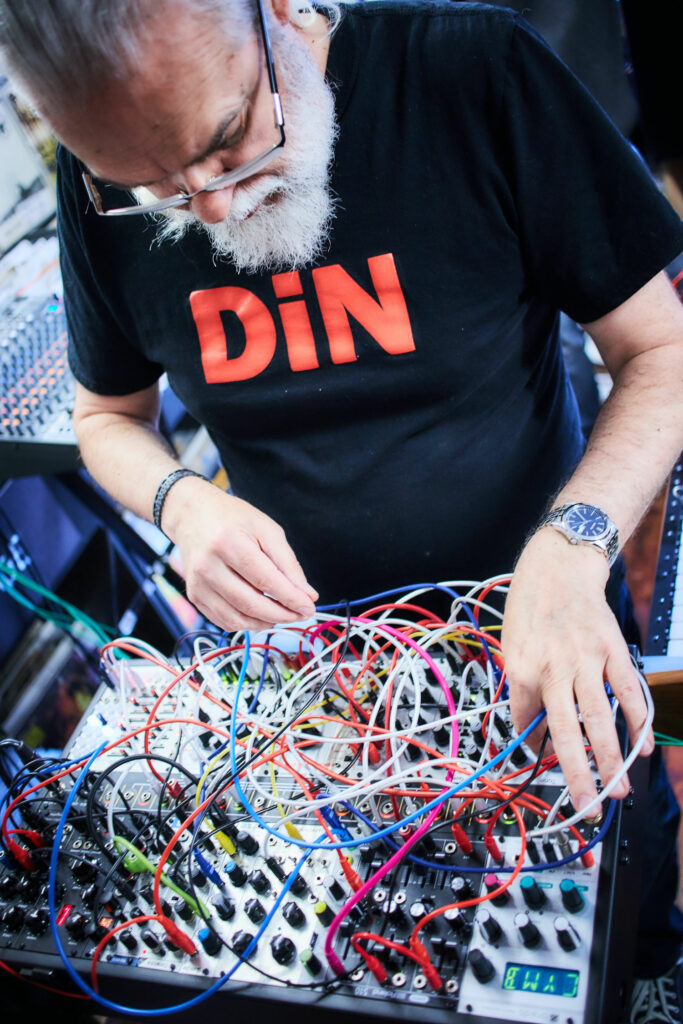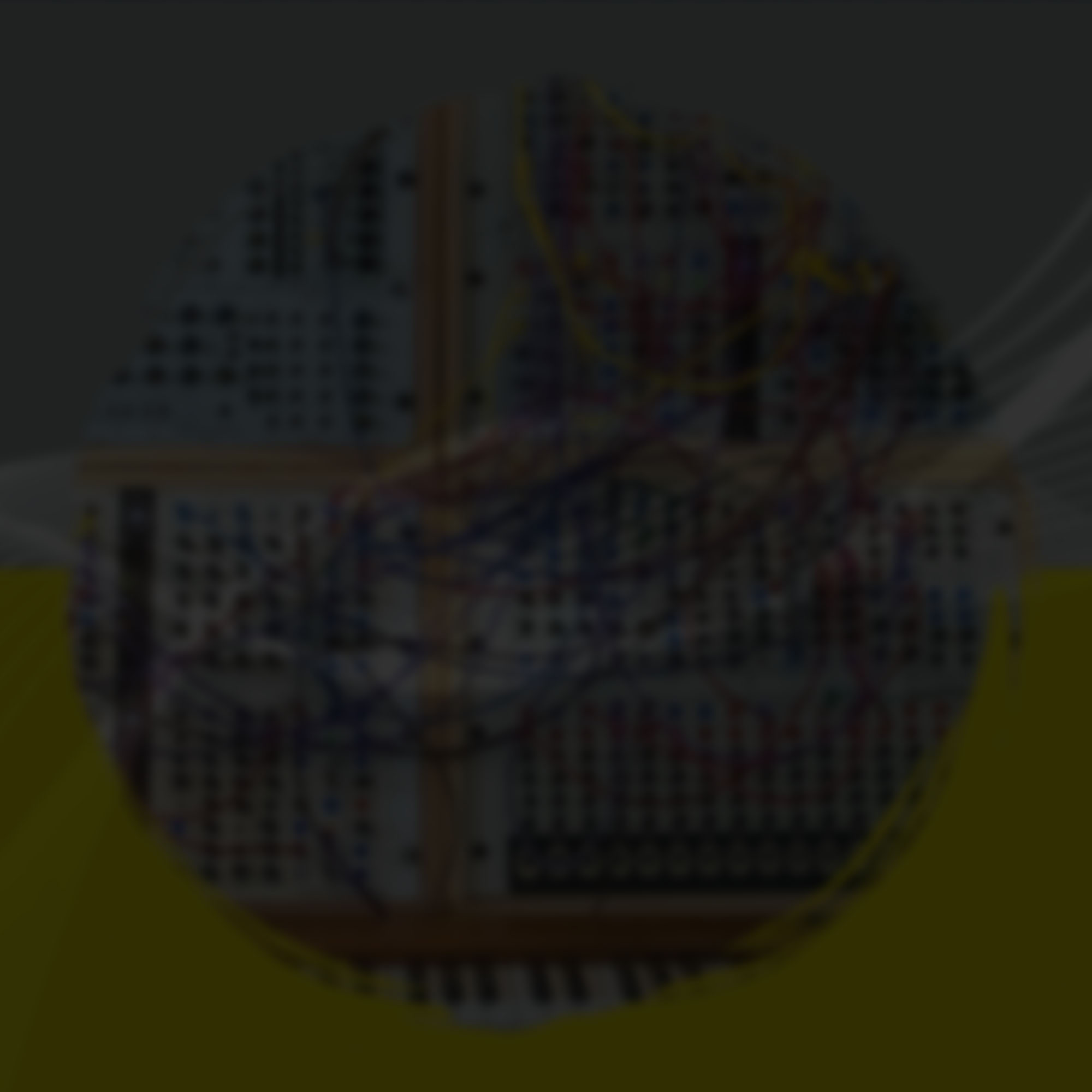Ian Boddy first got into composing music in the late 70’s in Newcastle upon Tyne whilst studying for a degree in Biochemistry. Having fallen in love with the sound-worlds of German electronic bands such as Tangerine Dream, he came across an arts centre that housed a studio filled with reel-to-reel tape machines and analogue synthesisers. Boddy taught himself how to use this equipment through a process of experimentation, thus began a long and successful music career.
From the mid 1980s till 2003 he worked at various roles in the music industry including a 12 year stint in sales with Akai UK. During this time he developed his musical style via a series of album releases, first on cassette and then on vinyl & CD. He also performed at many concerts including several of the UK Electronica festivals as well as venues in Germany, The Netherlands & USA. He also established contacts with sample CD companies such as Zero-G & the library music company DeWolfe.
Boddy set up the DiN label in 1999 and then in 2003 left Akai to pursue his musical career full time. Since then he has continued to release library music albums for several companies with tracks used on many TV shows, documentaries and films. His sound design skills have been in high demand with sound packs and virtual instruments released via several companies such as Zero-G, Time & Space, Camel Audio, Apple & Soniccouture.
The DiN label has grown and evolved to become one of the most respected independent electronic music labels in the world with 82 CD releases as well as 30 digital and the creation of the Tone Science sub-label which showcases artists working with modular synths. This latter series now has 4 volumes released and has been very well received in the modular community.
What have you been working on lately, and do you have any upcoming releases or performances?
I’m always working on several projects at once. My new solo album Axiom was released in November. This is very much a modular synth album with a lot of work on my Moog Matriarch & Serge system and features a lot of melodic as well as Berlin school style sequencing.
I also have a project with Bluetech that is in its early stages. But from day to day I have a lot of work to do with the DiN label preparing new releases & promoting the catalogue. In terms of performances obviously the Covid pandemic has put paid to all those with 7 concerts I had planned for this year all cancelled. There are tentative bookings for shows starting in July 2021 so I’m hopeful that eventually the world will return to a more settled state when folk can go to concerts safely.
How were you first acquainted to Modular Synthesis? When did that happen?
When I first started in about 1978 at the Spectro Arts Workshop I was lucky enough to have access to a VCS3 & AKS. Although these are not generally thought of as modular synths because of their unusual form of patching via that iconic pin matrix board they are indeed modular albeit with a fixed architecture. They’ve never been easy instruments to use especially in a live setting but they certainly have a unique sound. I managed to acquire a VCS3 for my studio around 1993 when they were very cheap to buy unlike now. It’s not a synth I use all the time but when I do it always gives me something special that I can’t easily reproduce with other instruments.
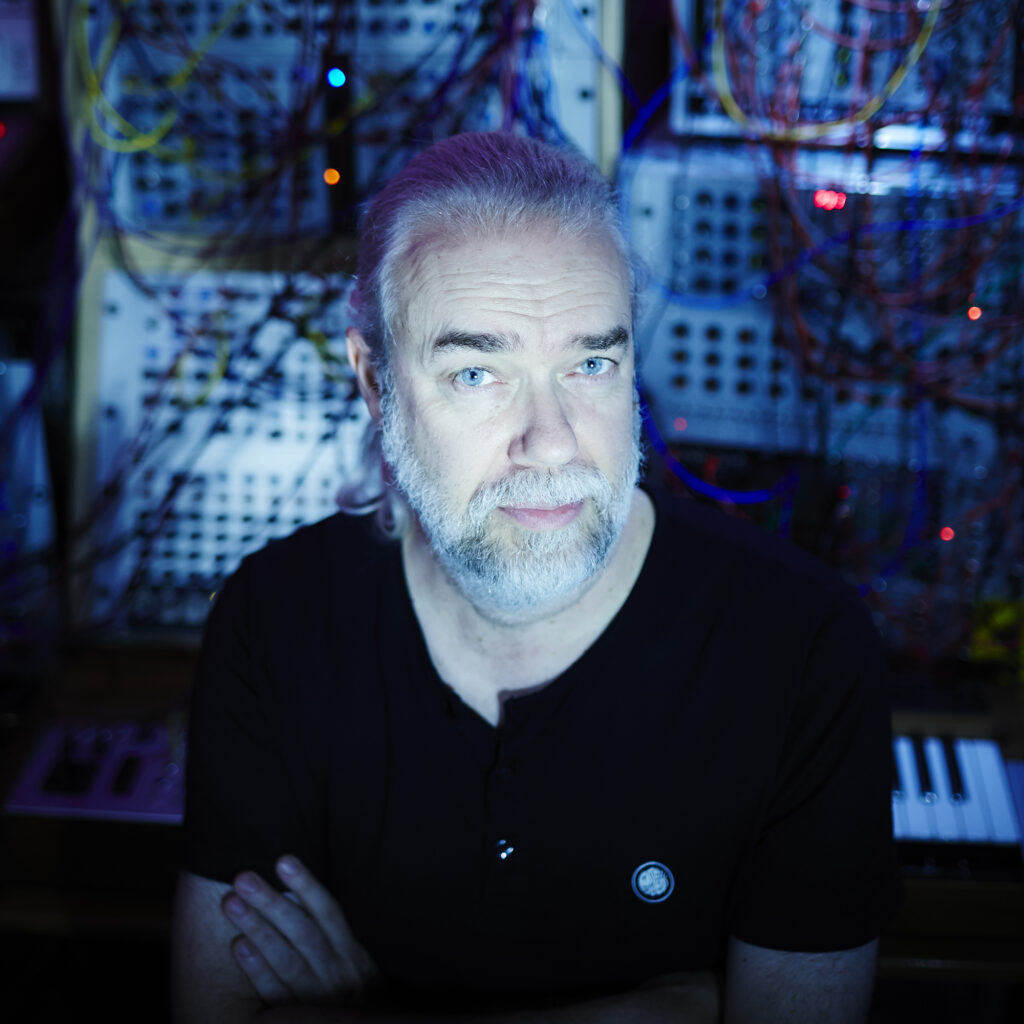
When did you buy your first system?
The first system I bought was in 1982 and was a 5 module Roland System 100-M rack. At the time that was just about the only really affordable modular and I still think it has one of the cleanest, most ergonomic designs of any modular. Most modules have the audio inputs at the top & the modulation inputs at the bottom giving a very clean easy way of patching. I still have that initial rack although I’ve since added another 2 x 5 module racks giving me 3 racks with a total of 15 modules. I also acquired the 184 Polyphonic keyboard at that time too which is great in that I can create 4 voices on the 100M & play these with up to 4 note chords from that keyboard – indeed I have also done this with my Serge system which sounds glorious.
What was the effect of that discovery on your compositional process?
On your existence?
Well for starters the 100M was far easier to keep in tune than the VCS3! As I mentioned I got my initial 100M in 1982 and used it extensively on my first vinyl album The Climb that was released in 1982. Previously I had released 3 cassette albums on the UK Mirage label so going up to a vinyl release was a big deal for me. Compositionally the 100M allowed me to compose more complex sequence & melodic lines as well as actually play chords with the 184 keyboard. Furthermore using the 100M got me into thinking in the modular way a lot more than the VCS3. They’re very different beasts and have their own musical personalities but I could now spend ages pouring over the Roland product catalogue to lust after other 100M modules that I didn’t have – I’m sure we’re all familiar with that particular pastime nowadays.
Quite often modularists are in need for more, their hunger for new modules is never satisfied? How do you explain that?
Well it’s just human nature really that thirst for more knowledge as well as new experiences. And of course the marketing folk these days are very astute at dangling these bright shiny new toys in front of us. I’m not that comfortable with it though as I feel things have got out of hand with so much choice, so many new modules coming out. Modern day life, for whatever reason, seems far more transitory and many folk simply aren’t prepared to put the time in to fully learn their instruments – they want instant results. To me some of the modular guys seem to treat their systems almost like train sets – it’s the collection of the gear that becomes more important than the actual process of making music. And lets face it with a modern rack of modules it’s relatively easy to make a nice interesting noise. But that’s not the same as actually composing something, to actually have something musically relevant to say. These things are emotions that come from within you & have nothing to do with how much gear you have.
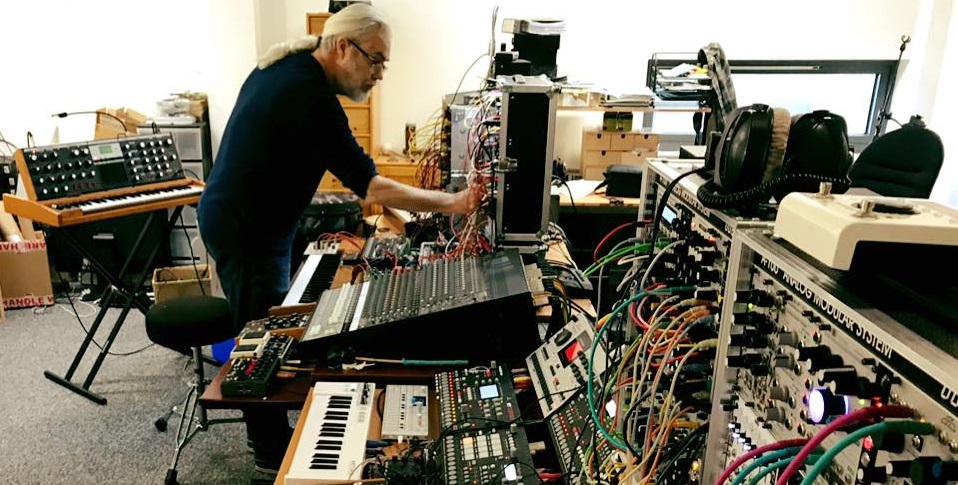
Instrument building may actually be quite compositional, defining your sonic palette, each new module enriching your vocabulary. Would you say that their choice and the way you build your systems can be an integral part of your compositional process?
Or is this the other way round and you go after a new module because you want to be able to sound-design some of your ideas?
This follows on from my response to the previous question. For me the music always has to come first. I never refer to my modulars as gear, for me they are instruments that I use to explore my musical ideas. I’m very selective in any new modules I purchase these days in that firstly I’ve already got a large palette of instruments to choose from so it’s not essential for me to even get anything new. However when I do it’s to fulfil a specific task or more recently to allow me to perform concerts & shows in a specific way. So for example I recently got the 1010 Micro BitBox as I wanted a unit that could play back multiple samples in a relatively small size and for me that particular module was ideal.
Another way I work, at least in the studio, is to treat all my gear as one large instrument. So I can interconnect them all and use each for their particular strengths. So for example I have the stereo Phaser module in my Serge system but whilst this is very nice it is sometimes a little too clean for a truly vintage sound. This is where my 100M comes in as I have 2 of the 172 modules giving me 2 lovely, swishy & in some way quite noisy Phasers. So I often patch out of my Serge through say these Phasers on the 100M & then back into the Serge whilst at the same time sequencing the Serge from my various Eurorack sequencers. They all work happily together and mean I can constantly change or adapt my overall instrument dependant on what my musical aims are for the particular piece I am working on.
Would you please describe the system you used to create the music for us?
Can you outline how you patched and performed your Modulisme session?
I wanted to just use the Serge system for this which is comprised of 6 x STS panels. Having said that I did use my Echo Fix EF-X2 tape echo machine for some vintage feel on the output.
For instance the patch notes below describe the system used for the track “Diatribe” which was based around the idea of having 4 VCO’s all tuned to a diminished scale such as C, Eb, Gb & A. Each of these voices was then sent through a VCA which was randomly triggered by 4 looping AR envelopes from 4 unsynchronised DTGs. But there’s lots happening with the sound. There’s FM between each pair of VCO’s which I manually bring in & out. The pairs of VCO’s are also cross faded & sent to 2 channels of the Triple Waveshaper that add extra harmonics via modulation. There’s also some Ring Mod in there as well as the Frequency Shifter adding different tones & sounds. White Noise is also coming through on the Variable Bandwidth VCF & Phasers. So from a basic simple core idea with the tuning of the 4 VCO’s I am adding a lot of extra harmonic content & tons of modulation. One of the main things I’m controlling is the rate of modulation overall as well as the shape of the AR envelopes which is how the piece fluctuates from relatively calm, slow, organic swells to a couple of quite violent frenetic climaxes.
The tape echo with it’s built in spring reverb helps with the 1950s sci-fi B-Movie soundtrack feel which is what I was aiming for with this piece. And of course it’s a single improvised take that I’ll never be able to repeat.
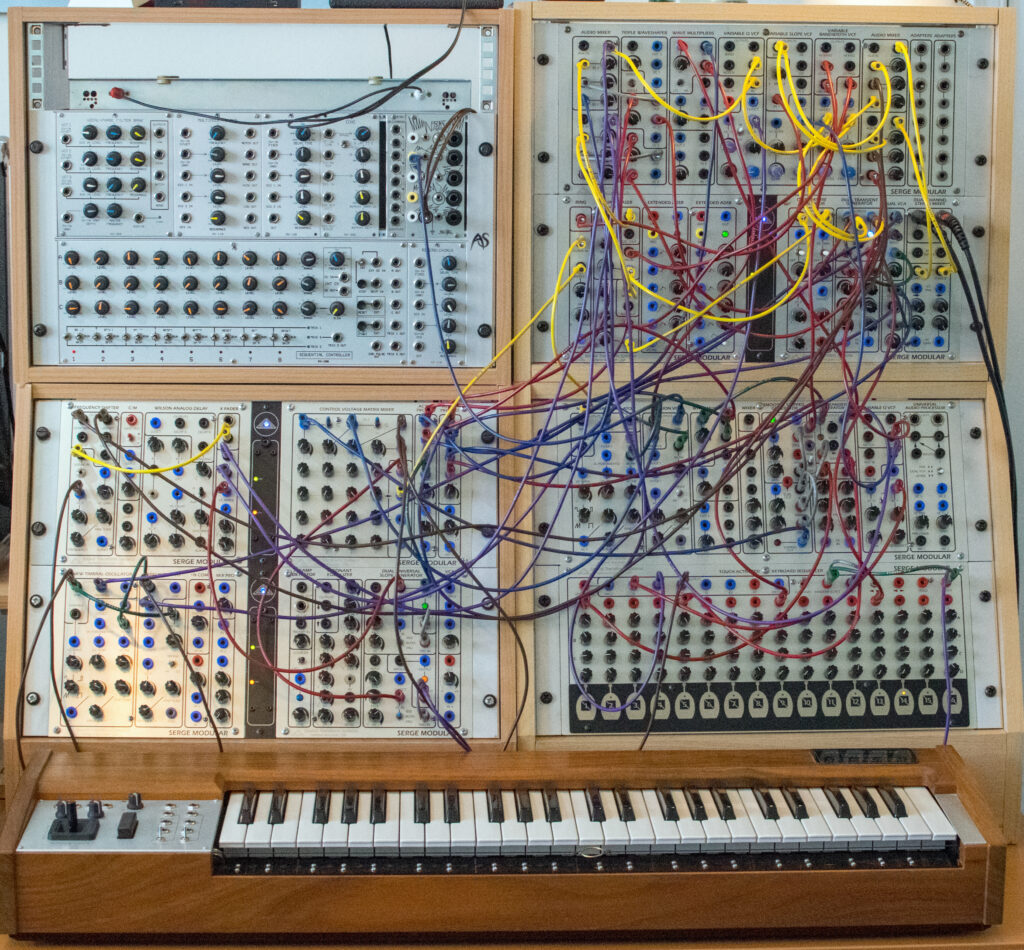
I know that you are owning some very nice instruments, any favorite which has been with you throughout the years and you keep returning to? EMS?
What would be the system you are dreaming of?
Well I have 4 main modular systems, the VCS3, Roland System 100M, Serge and a large number of Eurorack cases. Each has their own strengths and I love them all for different reasons but if I had to choose one it would be the Serge system. I started getting this about 10 years ago from STS in the States and having had a windfall of some nice royalties quickly assembled a 6 panel system. The original panel I got was the Animal and then I further expanded this with other boats with M-Class panels such as the Klangzeit and of course a TKB. I find it a joy to work with as the consistent panel design is a lot less confusing than the hotch patch that my Eurorack has evolved into. Also the extra real estate & space that 4U brings as well as the sturdy & reliable banana cables. But the thing I love more than anything is its sound – so analogue & so alive. Don’t get me wrong there’s a lot of incredibly advanced modules in Eurorack that go way beyond what I can do with the Serge but they are increasingly entering the digital domain and for me with my musical heritage that all analogue sound is something special that means a lot to me personally.
As for a dream system I’m old enough & hopefully wise enough now not to have such thoughts.
I’m more than happy with what I have than being worried or concerned with what I don’t have.
Are you feeling close to some other contemporary Modularists?
Which ones?
Which pioneers in Modularism influenced you and why?
I’ve never been one to particularly worry about or follow what other musicians do. In fact in many ways I don’t really spend that much time listening to others work simply because I don’t have the time and often if I’ve been working in the studio all day long I don’t want to listen to more music, I’d rather go for a quiet walk in the country with my partner & our dog.
The term Moduarism simply didn’t exist when I started out in the late 1970’s. The artists who were my biggest influence were the German bands such as Tangerine Dream & Klaus Schulze with their space music albums from the early 1970s such as Rubycon, Phaedra & Timewind.
The Tone Science series has enabled me to reach out & communicate with a lot of the more modern exponents of modular synthesis and provide a showcase for their talents. Certainly artists such as Scanner, Todd Barton, Lyonel Bauchet, Hainbach, Lightbath & Hélène Vogelsinger, to name but a few, are some of these artists who I can really appreciate musically as they each have a very individual musical voice.
You have been running the DIN label for years, how is the situation? How do you manage to survive? What is upcoming on the label?
Yes I’ve been running the DiN label since 1999 which is of course a long time. It’s grown & evolved over those years and again it’s given me the chance to work with & release music by some wonderful artists such as Robert Rich, Markus Reuter, Erik Wøllo, Tetsu Inoue, Bluetech, Mark Shreeve (as ARC) & Node to again name but a few. What is really helping these days is Bandcamp and how that is such a good route to interacting with customers who in return are buying more & more of the back catalogue as well as new releases. Certainly the enforced lockdown and cancellation of all concerts has hurt in turns of income but it has given me more time to concentrate on the label and help grow its popularity. I’m also fortunate in that I get a steady flow of royalties through on my library music projects which takes some of the financial pressure away.
I’ve already mentioned that the label has my new solo album Axiom (DiN64) due out in November as well as several other projects in the pipeline including early work in preparing Tone Science Volume 5.
Any advice you could share for those willing to start or develop their “Modulisme”?
Always a tricky question to answer but for me first & foremost comes the music. The gear is kind of irrelevant although of course having a nice modular set up gives you a nice palette of sounds to work with. But don’t get hung up on the amount of gear you have. Whatever system you are invested in try & figure out what you want to do musically and then go for those modules that will give you the scope to work with your ideas. Treat it as an instrument, spend the time to learn it. A modular is no different in my opinion than learning any other instrument such as a violin or a piano. if you spend the time to really learn how to play it you’ll make better music.
To know more about Ian Boddy:
http://www.ianboddy.com
https://dinrecords.bandcamp.com
